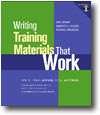 |
 |
 |
 |
 |
 |
 |
 . . |
|
| . |
 |
ISPI AWARD OF EXCELLENCE!
Wellesley R. Foshay, Kenneth Silber and Michael Stelnicki Writing Training That Works: How to Train Anyone to do Anything A practical guide for trainers based on current cognitive psychology and instructional design theory and research Published by Jossey-Bass Pfeiffer. To find out more or purchase a copy, click on the cover above. Evaluation copies for instructors are available by clicking here. |
|
|
EXPERIENCE IN TRAINING
|
|
- Training strategies that teach people to think and understand, not just to remember
- Maximizing return from your investment in training, using research
- Cost effective eLearning, simulation, game, and assessment architectures
- Upgrading your organization’s competency in training, whether you outsource or insource
- Research on cost effectiveness of training
Are we getting what we need most
from our training?
Probably not!
.....Today’s jobs, at every level, need people who can think, adapt, and solve problems internally and for clients. Today’s workers need to be able to find the information they need — fast — and incorporate it in their work — without training. Yet most companies believe that you can’t train people to do these things — and they often use training strategies that may actually prevent people from learning these critical skills!
.....The result is training that focuses on only low-level knowledge and skills, rather than high-value thinking and problem-solving.
.....Our bottom line: use strategies for training on the high value capabilities, and teach people how to retrieve the low-level facts and flowcharts on demand.
Is a $500,000 eLearning project 10 times more effective than a $50,000 one?
Maybe — or maybe not!
....The strongest research on effective instruction shows that many of the high-cost features of eLearning do not improve effectiveness! And, the instructional designs which have been shown to be most effective are often weak or missing from even the most expensive eLearning.
.....Effective eLearning isn’t always cheap, but making it more expensive doesn’t necessarily make it better; the easiest thing to build is the wrong training!
.....Our bottom line: the most cost-effective training strategy for your needs.
Which is more cost-effective: classroom or eLearning?
It depends!
.....There are tradeoffs in both directions. The best answer may be both: often called blended learning or flipped classroom solutions. Like the newspaper reporter, you should choose based on who you are training, to do what, when, and where the training is needed, why the training is needed, and how the trainees will use it.
.....Often, trainers spend time and effort on the wrong things. Much of what trainers believe is based on tradition, not research-based effective practice. The result is training that depresses effectiveness, lowers motivation, and wastes time and money: training that makes things worse, not better.
.....Our bottom line: training and assessment strategies which maximize effectiveness and minimize life cycle cost, whether eLearning
— or not.
|
|
|
 |
| Rob Foshay, PhD, CPT |
|
 |
|
| See ISPI interview |
|
....This month, the ISPI PerformanceXpress newsletter features an in-depth interview of Rob Foshay, CPT, PhD. ISPI is adding his Cognitive Task Analysis Model to the TrendSpotters Open Toolkit.…
|
 |
|
|
|
| JTA versus CTA! |
|
....Job Task Analysis, JTA, is done to discover the task/subtask structure of a job. ....Cognitive Task Analysis, CTA, is done to discover the decision-making processes and mental models which are embedded in job tasks.…
|
 |
|
|
You can't train people
to do that! |
|
....Think of who your MVP is: the person who can provide innovative, valuable solutions to your customers (whether internal or external)—not just products. Do you really understand how your MVP’s work their miracles? Probably not…
|
 |
|
| What is expertise? |
|
....Expertise exists at every level of your organization. It’s your most valuable competitive asset — and also your scarcest. Its scarcity is probably the greatest single factor limiting your growth. It also goes home every night, and it’s what you lose when your MVP retires or goes over to the competition.
|
 |
|
| The cognitive approach to training |
| ....According to cognitivists, there are several components of the mind, and each is involved in the learning process in certain ways. How each component of the mind works has implications for how we design instruction. The components are: … |
 |
|
|
 |
| . |
|
|


